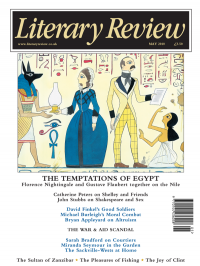Leslie Mitchell
We The People
When London was Capital of America
By Julie Flavell
Yale University Press 289pp £20
Before 1776 there was no such thing as American. The adjective merely described the contents of a swathe of British colonies in an arc running from Nova Scotia through to the West Indies. Animals and plants could be called American. So too could the indigenous populations. Mohawk and Cherokee chiefs visiting London in the 1760s were plainly not British. But most people living in the colonies regarded themselves as British citizens who happened to live on the other side of a great ocean. As a consequence, England in particular was ‘home’, and they claimed the liberties of their compatriots with the same enthusiasm that they aped their fashions.
For people who thought this way, London was naturally seen as their capital city. It was perhaps twenty times larger than Boston or New York. For colonials, as for Yorkshiremen or East Anglians, London was the ultimate destination for the ambitious and those with pretensions to gentility. Acutely

Sign Up to our newsletter
Receive free articles, highlights from the archive, news, details of prizes, and much more.@Lit_Review
Follow Literary Review on Twitter
Twitter Feed
The era of dollar dominance might be coming to an end. But if not the dollar, which currency will be the backbone of the global economic system?
@HowardJDavies weighs up the alternatives.
Howard Davies - Greenbacks Down, First Editions Up
Howard Davies: Greenbacks Down, First Editions Up - Our Dollar, Your Problem: An Insider’s View of Seven Turbulent...
literaryreview.co.uk
Johannes Gutenberg cut corners at every turn when putting together his bible. How, then, did his creation achieve such renown?
@JosephHone_ investigates.
Joseph Hone - Start the Presses!
Joseph Hone: Start the Presses! - Johannes Gutenberg: A Biography in Books by Eric Marshall White
literaryreview.co.uk
Convinced of her own brilliance, Gertrude Stein wished to be ‘as popular as Gilbert and Sullivan’ and laboured tirelessly to ensure that her celebrity would outlive her.
@sophieolive examines the real Stein.
Sophie Oliver - The Once & Future Genius
Sophie Oliver: The Once & Future Genius - Gertrude Stein: An Afterlife by Francesca Wade
literaryreview.co.uk